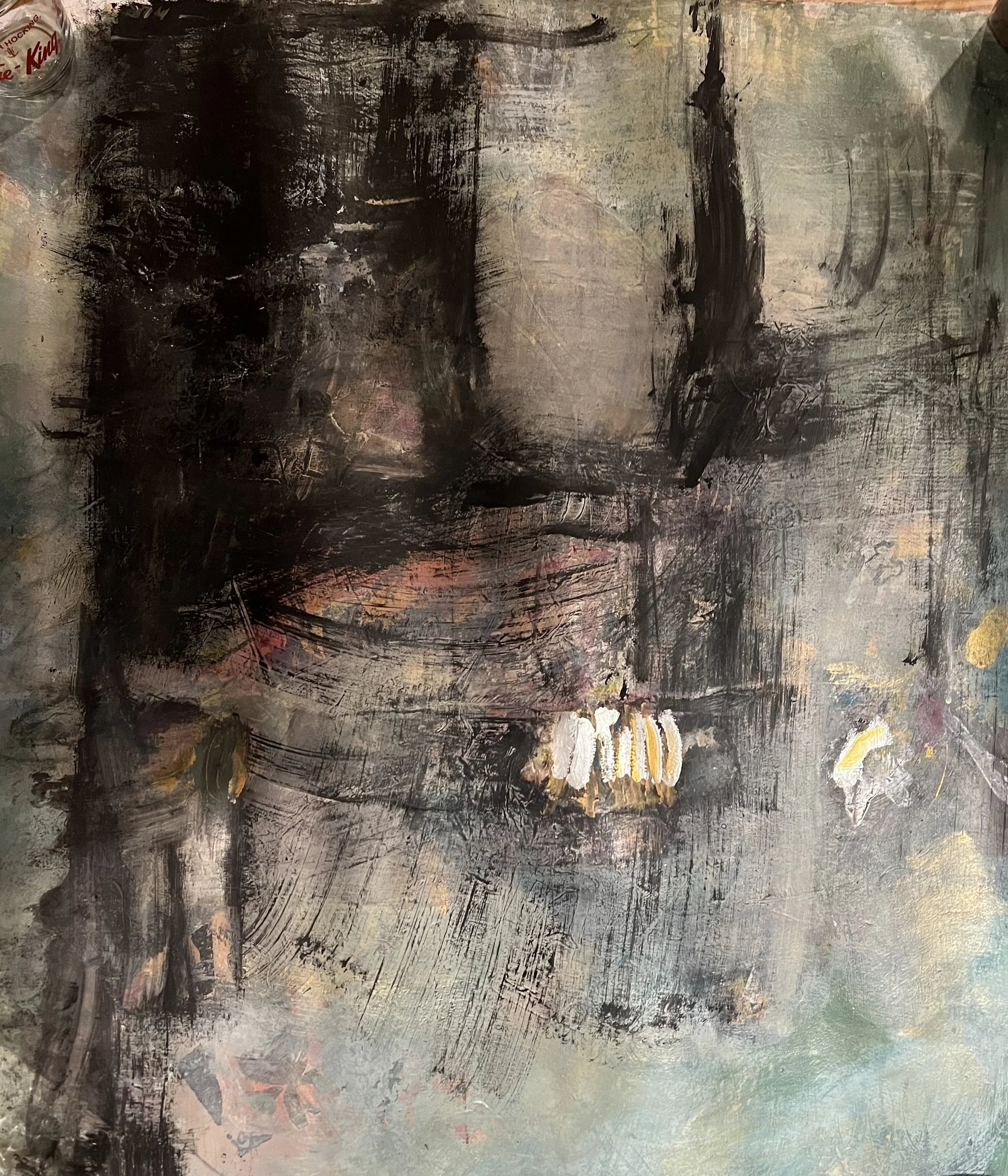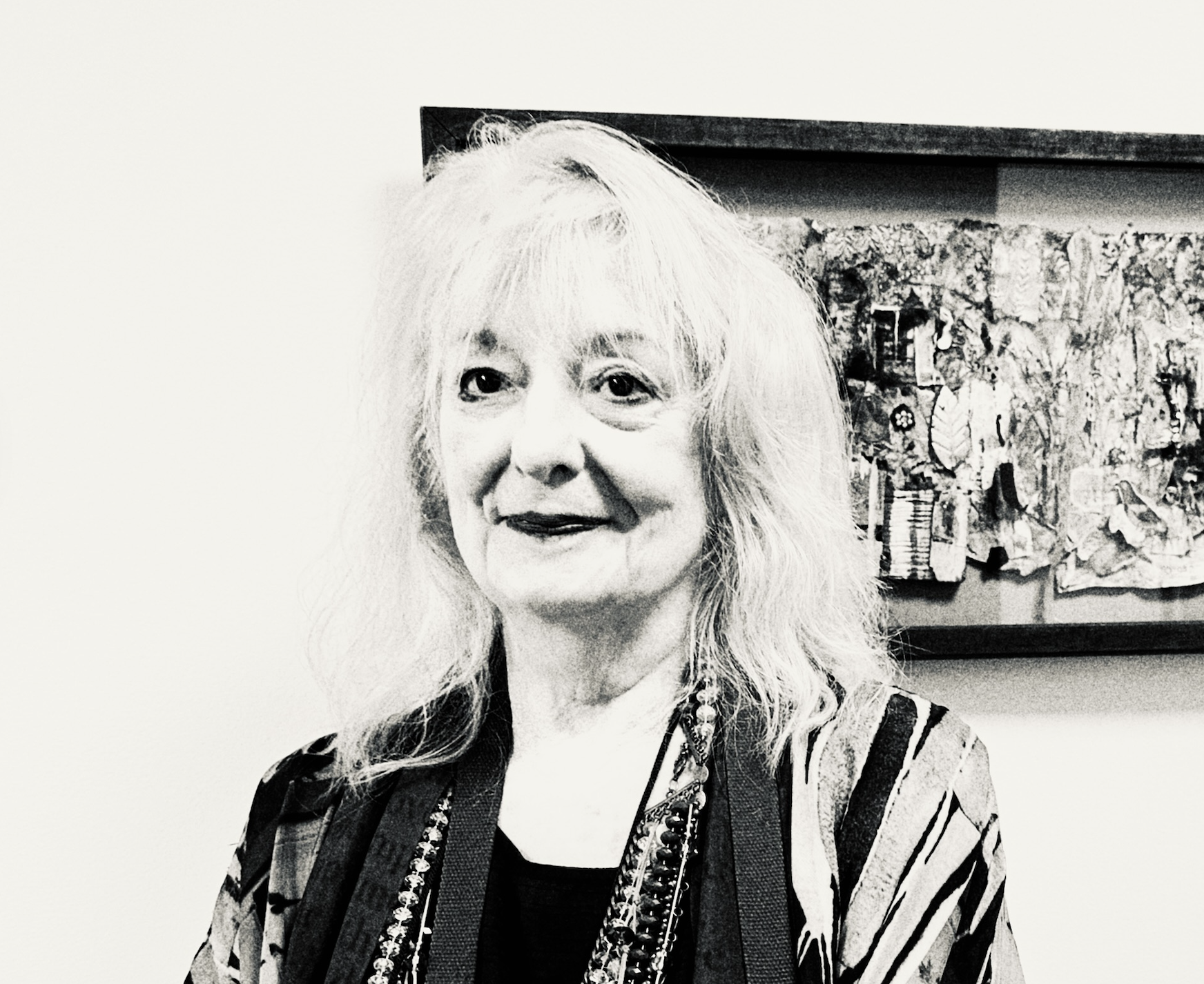“One Vertebra at a Time” by Marsha Recknagel
Credit: Marsha Recknagel
The first neurologist was mean. He walked in the room where I sat on the edge of the exam table, and although I’d waited an hour, he made no apologies. He sat down in front of a computer on a table across the room, his back to me as he scrolled and typed. With a swivel, and a kick off he wheeled his stool in front of me. He shined a light in my eyes and felt my lymph nodes. Again, a sudden push off with his shoe, and he rolled back to the computer.
“You don’t have MS,” he said, and picked up the folder on the desk, put his pen in his white coat pocket, and got up to leave. “You are severely anemic,” he said. “Get some Vitamin D in you. No wonder you can’t think straight.” Then he was gone.
I’d waited four months for the appointment. My hope for help had kept me moving the dead weight of my body from bed to shower to work each day. Each day I felt might be my last day. As empty as the room, I sat on the edge of the exam table. My head felt like a bowling ball. It was that heavy. I let it hang.
***
The next neurologist had ordered an MRI before the appointment. I was in his office to hear the results. Seated in a row on one side of the room were three young interns, pens and notebooks in hand. He was much older than the first neurologist. He used his black shiny shoes to swivel an old leather chair around, not without some effort. He turned the chair from a small computer table behind his huge desk to face the interns. Without even a glance at me, he told them, “Everyone else will tell her she has MS. But she doesn’t.” He rolled to the computer, positioning the screen for the interns to see. With a pencil, he tapped the screen. “See these white spots? Here, here and here?” I could see nothing. “Just like any other middle-aged brain,” he said. “Ischemic events.” He smiled and chuckled. “Minor blips that come with age.”
The computer was old. The doctor was old. I should have been happy that I merely had a buckshot spray of old age nicks in my brain tissue. I was anything but happy. He scribbled out a prescription for my restless legs.
Three weeks later, I called him. I’d had no respite from the muscle spasms in my legs. I’d had two episodes of vertigo. I was sleep-deprived, in full-throttled despair as I clutched my phone, pleading for help.
“You have to stop drinking,” he said. I didn’t even respond. I thought he must have gotten my file mixed up with someone else’s. I’d not had a drink in months. If I drank, the muscles were animals scratching deep within my calves. The only way to quell the sensation was to keep moving. Many nights I dragged myself up and down the road in front of my house until sunrise. I couldn’t have foreseen these nightly walks would be the last long walks I’d manage for years.
After our call, I sat looking out the window, puzzled and stricken with shame. Beads of sweat formed around my hairline. I’d had a lifelong fear of ever being like my sister, a fall-down drunk most of her life. If I protested, I knew he’d think I was in denial, the telltale sign of a true alcoholic.
A couple of nights later, as I walked the road, the sunrise began to change the dark night to a pale blue. A pearl sliver of moon still shared the sky with the sun emerging from behind the hills. I realized why he’d drawn his conclusion. The forms I’d filled out in the waiting room. The section asking for a family history. I’d dutifully filled in the small spaces, worried I couldn’t remember the dates for births and deaths. Father. Deceased. Heart. Mother. Deceased. Heart. Sister. Deceased. Alcoholism. Niece. Deceased. Alcoholism. Date of death: Before her mother.
The doctor had drawn conclusions.
When I tell the story of this neurologist, I call him The Dinosaur. I’m sure he thought of me as The Drunk.
***
The next neurologist said he’d need to do a lumbar puncture. I told him I wanted it done in a hospital. I had scar tissue, I told him. I’d had two laser surgeries on L4 and L5.
“I always do them in the office,” he said. “I’m good,”
I had on a hospital gown, the back opened, lying on a narrow exam table covered with tissue paper. He pulled on blue gloves as he walked through the door. “Face the wall,” he said. I turned, curled myself into a curve, and touched the white plaster wall with my fingertips. First he hit a nerve, then he hit the bone. The serpent of my spine roared. My body burst into a sweat while my mind, a hurt animal, retreated deep inside me.
A snap of his surgical gloves, the metal trash can opening, the soft thud of the gloves. He was finished.
“Can’t get any,” he said, meaning spinal fluid.
“Try again,” I said.
“Really?” he said, more a statement than a question.
“Really,” I said. I heard him rip open another package. A new needle. As he slid it in my back, the beat of blood throbbed behind my eardrums, a hot sensation moved from the small of my back to my hands to my eyes. Again I heard the snap of the removal of rubber gloves. He was already at the door when I whispered, so hoarse I sounded a stranger to myself. “Do it again.”
“You gotta be kidding me,” he muttered, more to himself than to me. He told me to make an appointment at the hospital on my way out. When I got up from the bed, wet tissue came up with me. As I plucked at the gluey tissue, he stood half in, half out of the door.
“Nothing’s ever easy with you, is it?”
***
In the OR of Mayo Hospital, where difficult to diagnosis patients are seen, three residents were busy behind me. “Raise yourself up, like in the yoga Cobra Pose,” one told me. Another said, Sacrum, as he lightly touched my back where the needle would go in. Sacrum, I turned the word over in my tranquilized mind. From the Greek word for sacred. I remembered my former yoga teacher. Holy, I thought, one’s spine. She’d been reverent about the spine, spoke of it as if it was a ladder to a higher power. I noticed a screen right above my head. “You can watch,” one of the residents said. I looked as the needle, a silver serpent, moved toward my spine, inching slowly around the scar tissue. My spine branched white against a black background like a birch tree at midnight in winter.
It wasn’t long before they huddled around the full vial. I craned my neck to ask them if I could see too. One laughed and said I was the first patient who’d ever asked. He held the vial up to the light. He explained the fluid is usually hazy yellow, sometimes red. He smiled. “Your’s is crystal clear.” A good sign, surely. I learned the next day I have MS. The fluid held microscopic bits of protein seared from the fatty tissue covering nerves, a sign of my immune system mistaking it for something foreign, not-me, a virus perhaps. What could be thought of as a betrayal I’ve learned to think of as misguided. Friendly-fire.
In the neurologist’s office there was a light box where the MRI was lit from behind. “I don’t see how anyone could miss this,” he said of the white spots around my brain stem. “It’s obvious.”
“What can be done,” I asked. He leaned back in his chair. He looked like a banker. “Some think amantadine helps, Provigil for energy, iron infusions. Diet? Meditation. But MS, it’s a mystery.”
A friend was with me. She had a legal pad in her lap, pen poised. She took no notes.
***
My yoga teacher told us spinal fluid is our life force. She said we could use our minds to move it up and down our spines. At the end of each class she would take a deep breath, exhale, then ring a brass bell and when the bell slowed to silence, she’d exclaim, “Open your hearts!” She would lift up her arms. “Stretch! One vertebra at a time,”she’d say with a German lilt. We’d lift our arms to reach for the sky, our hands in motion as if climbing a rope. That’s how we readied ourselves to rejoin the world. With open hearts. One vertebra at a time. Open your heart. Rejoin the world. One vertebra at a time. That’s what I do. Every day.
Artist Statement
I was a writer. Since I learned to write, I wrote stories. But in 2009 MS took hold of me, body and mind. Walking became more and more difficult, as did writing. I didn’t like the story I’d become. I feared I was whiny or incoherent. MS brain fog had set in and the words weren’t coming. I stopped writing. The fluidity of movement I’d lost physically and mentally, I found while painting. Ten years went by before I had the urge to write again. In a workshop, a fellow artist asked me to make a piece of art that would show her how it felt to have MS. I began to create a group of large collages depicting good days and bad days and day-to-day days. During an art residency at MASSMoCA, another artist suggested I give a TED talk about coming to art after my diagnosis. This suggestion set in motion my current project. I began to write what has become a narrative, a manuscript spun out of words and coupled with images. Students new to the craft of writing are always told to show, not tell. This is usually excellent advice. Sometimes though, “Telling” can be underrated. I’ve begun to show and to tell.
Marsha Recknagel, a writer and artist, taught literature and creative writing at Rice University in Houston for over twenty years. She has a PhD from Rice and an MFA from Bennington Writers Seminars. She did psychoanalytic training at The Houston Psychoanalytic Institute. Her memoir, If Nights Could Talk, published in 2001, was adapted for film by Hallmark Hall of Fame. Her work has been published in Gulf Coast, the Columbia Review, The Journal and MicroLit. In 2024 she had a solo art show at the Intercommunity Gallery in East Hartford, CT. Her collages and paintings have been in juried shows in North Adams, MA, Bar Harbor, ME, Boca Grande, Fl, and Hartford, CT. For the last three years she’s worked on a mixed-media memoir called Ungainly Grace. She lives in Williamstown, MA. Follpw Marsha on Instagram: marshamystic


